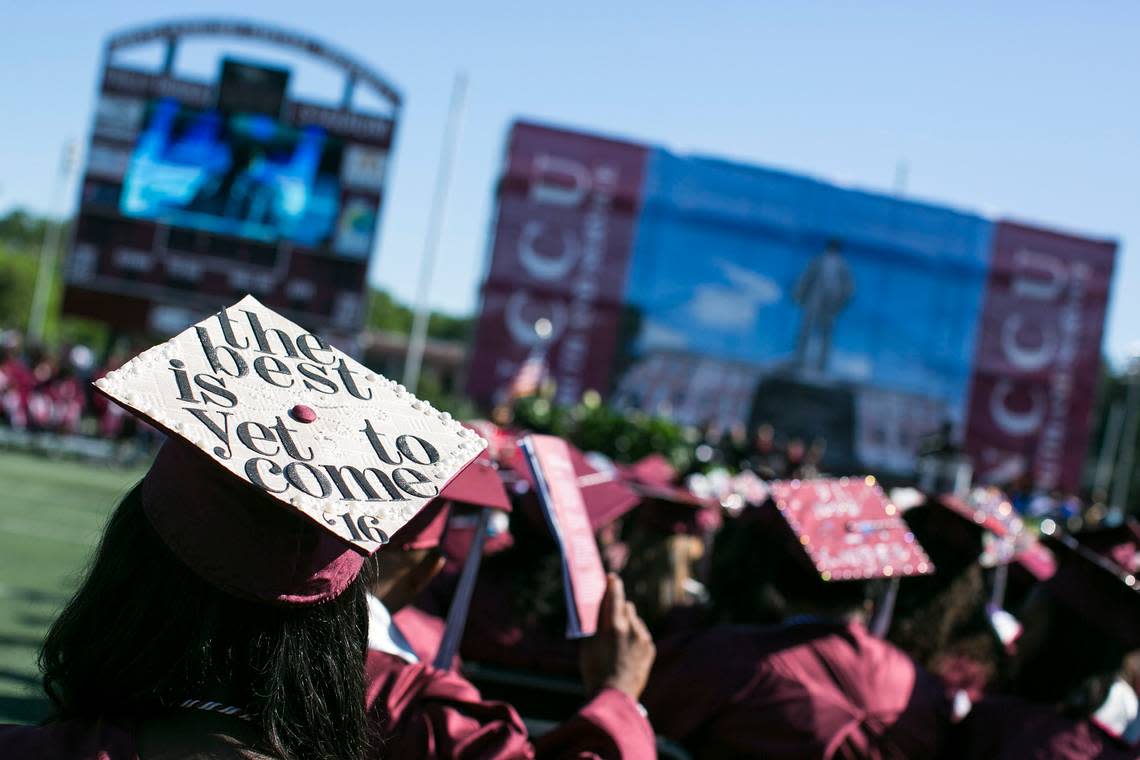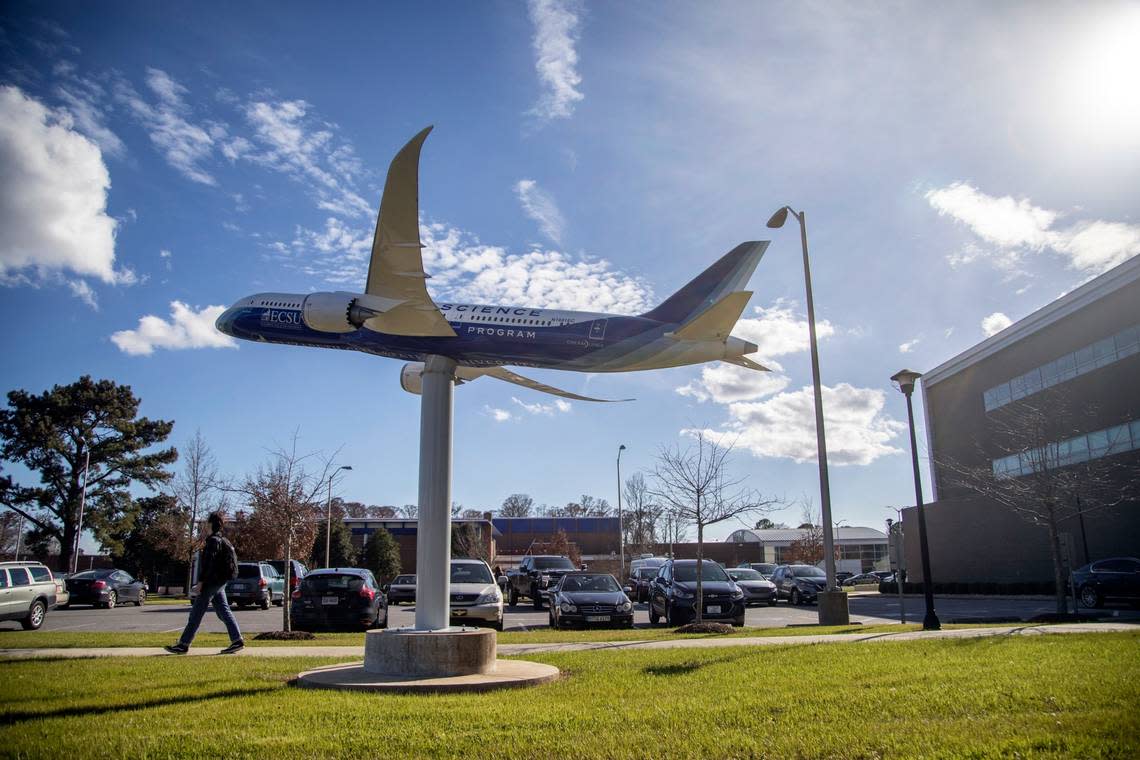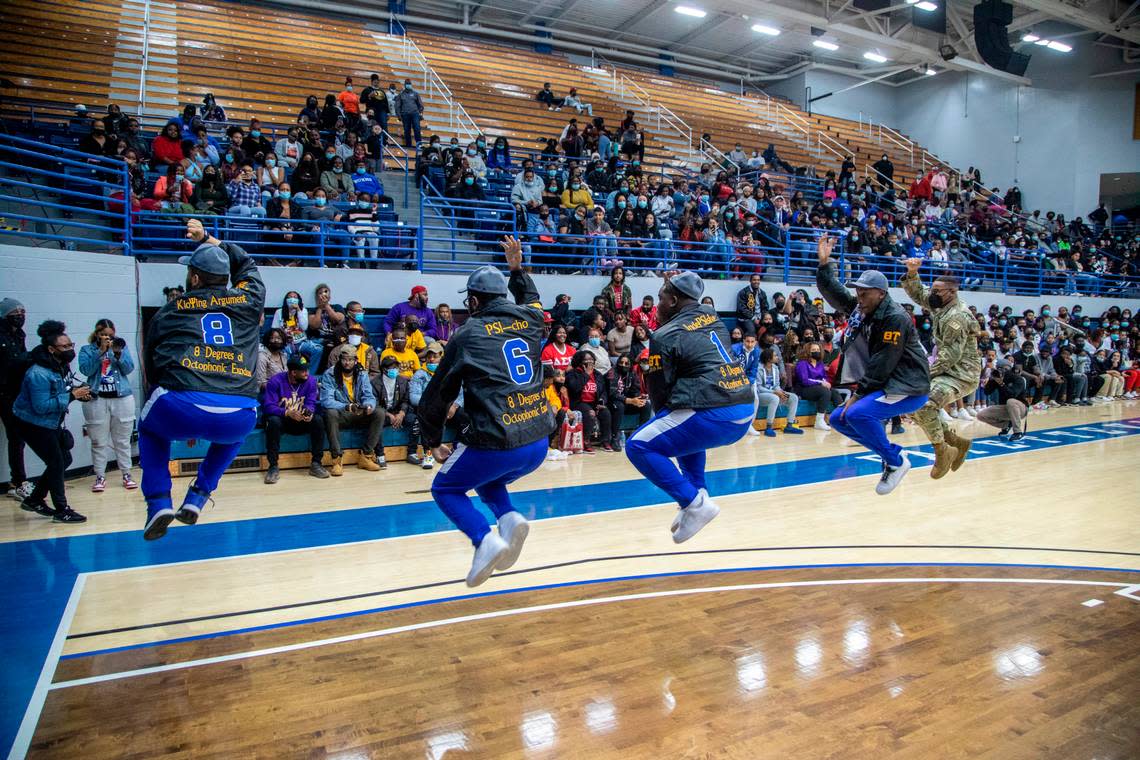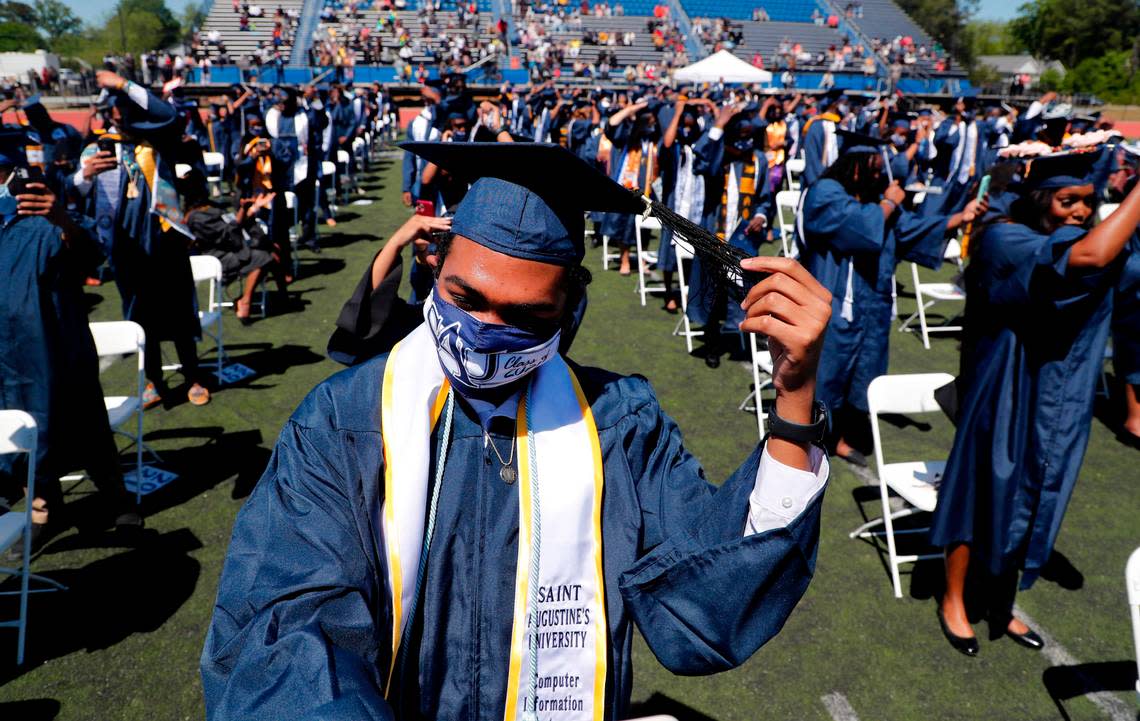Here’s how North Carolina’s 10 HBCUs stack up in the latest US News college rankings
North Carolina is home to the nation’s largest historically Black university and the oldest HBCU in the South, making it a destination for Black students pursuing a college degree.
The latest U.S. News & World Report rankings show how the state’s HBCUs, from small private colleges to large research institutions, compare to their peers across the country. The 2022-23 rankings measure the quality of undergraduate education at 77 eligible schools based on student graduation and retention, student debt, peer assessments and social mobility for low-income students, among other factors.
Ten HBCUs in North Carolina made the list, with North Carolina Agricultural and Technical State University earning the highest national ranking at 9th overall and third among public HBCUs.
For years, North Carolina A&T State has enrolled more students than any other HBCU in the country. NC A&T enrolls more Black first-year students each year than U.S. News and World Report’s top 10 national universities combined, according to the university. Its enrollment has grown by about 25% over the past seven years.
This fall, the university set another institutional and nationwide enrollment record with more than 13,500 students. Chancellor Harold Martin’s plan is to surpass that record again next fall.
Earning top U.S. News rankings certainly helps NC A&T work toward that goal as students, parents and college advisors look to the annual report, despite its flaws, for insights when assessing universities.
Here’s how the historically Black colleges and universities in North Carolina stack up this year, according to U.S. News & World Report.
▪ North Carolina A&T in Greensboro was the state’s highest ranked HBCU at 9th overall, tied with Claflin University in South Carolina. The Aggies ranked 3rd among public HBCUs behind Florida A&M University and Delaware State University. A&T is part of the UNC System.
A&T’s first-year retention rate is 78% and the graduation rate is 52%, according to the rankings.
NC A&T ranked 299th among all national universities and 156th among public schools. The land-grant university ranked 41st for social mobility and 52nd for most innovative among its peers. A&T’s undergraduate business program ranked 365th, nursing program ranked 356th and engineering program ranked 150th among schools with doctorate programs.

▪ North Carolina Central University in Durham ranked 14th among all HBCUs, tied with Dillard University in Louisiana, and 5th among public HBCUs. NCCU is part of the UNC System.
NC Central’s first-year retention rate is 78% and the graduation rate is 50%, according to the rankings.
NCCU ranked 46th among all regional universities in the South and 18th among public universities in that category. NC Central ranked 44th for best value and 10th for social mobility. Its nursing program ranked 293rd among its peers, tied with Fayetteville State University.
The university was also recognized for its economic diversity, with 65% of its student body receiving federal Pell grants, which are designated for low-income students.
NC Central is also listed among schools with graduates who have high debt, with more than 80% of first-year students taking out federal loans and the median federal loan debt among graduates being $29,000.
▪ Winston-Salem State University, a public HBCU in the UNC System, ranked 19th among all HBCUs in a tie with Jackson State University in Mississippi and Norfolk State University in Virginia.
WSSU’s first-year retention rate is 77% and the graduation rate is 50%, according to the rankings.
In the overall rankings, WSSU moved up into the national universities category from the regional universities. Winston-Salem State ranked 285th overall and 146th among public universities.
The university also ranked 18th for social mobility and was named a top 10 school for economic diversity among peers, with about 64% of its students receiving Pell grants.
▪ Elizabeth City State University, a public HBCU in the UNC System, ranked 23rd among all HBCUs, tied with Alcorn State University in Mississippi and Clark Atlanta University in Georgia.
The university’s first-year retention rate is 73% and the graduation rate is 41%, according to the rankings.
ECSU ranked 31st among regional colleges in the South and 3rd among public schools in that category. Elizabeth City State also ranked 18th for social mobility and 4th for veterans among its peers. The university was also recognized for its economic diversity, with 68% of its student body receiving Pell grants.

▪ Johnson C. Smith University, a private HBCU in Charlotte, ranked 26th among all HBCUs in a tie with four other schools.
The university’s first-year retention rate is 64% and the graduation rate is 44%, according to the rankings.
Among all national liberal arts colleges, Johnson C. Smith ranked in the bottom 25% and 81st for social mobility. The university was recognized for its economic diversity, with more than 70% of its student body receiving Pell grants.
▪ Fayetteville State University, a public HBCU in the UNC System, ranked 31st among HBCUs in a tie with Alabama State University and University of Arkansas-Pine Bluff.
FSU’s first-year retention rate is 68% and the graduation rate is 36%, according to the rankings.
Fayetteville State ranked 72nd among all regional universities in the South and 33rd among public schools in that category. FSU’s nursing program ranked 293rd, tied with NCCU. The university ranked 19th overall for social mobility and was recognized for its economic diversity, with more than half of its student body receiving Pell grants.

▪ Bennett College, a private HBCU for women located in Greensboro, ranked 45th among HBCUs in a tie with Florida Memorial University and Mississippi Valley State University.
The college’s first-year retention rate is 52% and the graduation rate is 41%, according to the rankings.
Among all national liberal arts colleges, Bennett ranked in the bottom 25% and 91st for social mobility. The college was also recognized for its economic diversity with more than 70% of its student body receiving Pell grants.
▪ Livingstone College, a private college in Salisbury, ranked 49th among HBCUs in a tie with five other schools.
The college’s first-year retention rate is 53% and the graduation rate is 25%, according to the rankings.
Livingstone ranked ranked 68th among all regional colleges in the South and 20th for social mobility.
The university was also listed among schools with graduates who have high debt. About 87% of first-year students take out federal loans and the median federal loan debt among graduates is $32,875.
Livingstone was also recognized as the top school for economic diversity with 95% of its student body receiving Pell grants.
▪ Saint Augustine’s University, a private HBCU in Raleigh, ranked in the bottom 25% of HBCUs along with about 20 other schools.
The university’s first-year retention rate is 52% and the graduation rate is 21%, according to the rankings.
Saint Aug’s ranked in the bottom 25% of regional colleges in the South and 65th for social mobility. The university was also listed among schools with graduates who have high debt. About 89% of first-year students take out federal loans and the median federal loan debt among graduates is $31,000.
SAU was recognized for its economic diversit,y with about three-quarters of its student body receiving Pell grants.

▪ Shaw University, another private university in Raleigh and the oldest HBCU in the South, also ranked in the bottom 25% of HBCUs.
The university’s first-year retention rate is 57% and the graduation rate is 17%, according to the rankings.
Shaw also ranked in the in the bottom 25% of regional colleges in the South and 95th out of 99 for social mobility. The university was also listed among schools with graduates who have high debt. About 91% of first-year students take out federal loans and the median federal loan debt among graduates is $31,500.
Shaw was recognized for its economic diversity, with about 75% of its student body receiving Pell grants.
